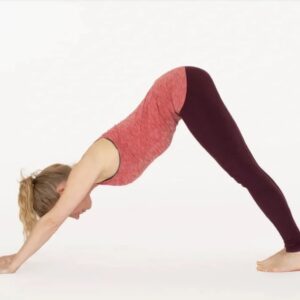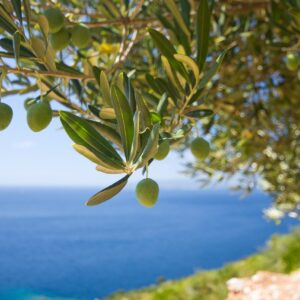5 Sivan, 5783, Erev Shavuot
May 25, 2023, the eve of Shavuot
The Talmudic sage Rava (c. 280 – 352 CE) teaches, “Once a person renders himself like a wilderness, deserted before all (mufkar lacol), the Torah is given to him as a gift.”
*
Against her will, my mother has become like a wilderness. A few days after her husband of sixty-two years died, she gave away all of his clothes. She said “no” to support services offered by the hospice where he was cared for in his final days. She spent much of the next year and a half alone in her apartment, eating coffee yogurt for breakfast, solving the Philadelphia Inquirer’s crossword puzzle, dozing during “General Hospital,” “Jeopardy,” “Law and Order: SVU.” When the weather was good, she sat on her porch, smiling and saying hello to other residents whose names she didn’t know as they came and went. She enjoyed occasional visits from family. Then came the ER. Then came 24-7 live-in care. Then came in-patient rehab. Then came the assisted-living residence. Though she has two dear, old friends there, she’s more alone now than ever. Deserted, like a wilderness.
*
I don’t know the desert. I’ve slept in a palm-branch hut, rented for $1 a night from a Bedouin, by the Red Sea in the Sinai Peninsula when it was under Israeli control. I’ve spent hours in a broken down Jeep waiting for help somewhere in the Sinai. I’ve watched the sunrise from atop Masada in the Judean Desert. Just a few weeks ago, I visited Joshua Tree National Park, where two deserts, the Mojave and the Colorado, meet. Six hours in the desert isn’t enough to forget the taste of fish, cucumbers, melons, leeks, onions, and garlic. Not enough time to render myself deserted from the economic, social, political, technological, agricultural, ideological, institutional (including religious institutions) systems to which I am bound.
As I entered retirement, I imagined a period in which I could empty myself of “professor,” “colleague,” “administrator,” even of “poet” and “writer.” Roles by which I am known, by which, in relation to others, I know myself. “Deserted before all,” who would I be? It’s been two years now. Have I rendered myself like a wilderness?
*
Night is the worst. Unlike most of the other nights when she calls late, she isn’t crying. But I can hear around the edges of her voice that she has been crying. I just need to hear the voice of someone who I know loves me.
*
Min ha meitzar karati, “From the narrow place I called” (Psalm 118: 5).
Meitzar: “narrow, constricted place.” Egypt, in Hebrew: Mitrayim, the Narrow/Constricted Place, the place of enslavement.
*
I don’t know how to deal with this, she says, what my life has become. She’s in bed. I’m in bed—six hundred miles away from the room her life has become. A room among other rooms, a life among other lives, women and men whose bodies and minds, in whatever ways now failing, delivered them to this narrow place. A dishtowel. A nightgown. A lipstick. A walker. A family photo.
*
I can’t drive to her. I can’t fly—not at this hour, not in the morning or day after tomorrow or the day after that. I don’t know what to say. I’m stuck in a narrow place. When we spoke a few hours earlier, I asked about her two friends. I asked if she was getting to know anyone else. A man has been joining them at their table in the dining hall, she said. I think he likes me, she said.
*
When my father was dying, my mother spoke to God. Take him quickly. Don’t let him suffer. I don’t know if she’s talking to or about God now. I don’t know if the Psalm 118 blues would comfort her.
All the nations surrounded me. With the Lord’s name I cut them down. They swarmed around me, oh they surrounded me. With the Lord’s name I cut them down. They swarmed round me like bees, burned out like a fire among thorns. With the Lord’s name I cut them down. (Psalm 118: 10 - 12, translated by Robert Alter)
*
Night: I’m surrounded, I’m trapped. Like my mother, I have trouble sleeping. Some nights, like a caged animal I fight frantically for freedom until I exhaust myself.
*
She’s already deep into her sleep aids—to little effect, it seems. I’ve just swallowed mine.
I’m having a hard time accepting that this is what my life is now. At least six months ago, when I was still living in my apartment, I could drive. I had some control over my life.
Just when I felt I had no “inner resources” (“I conclude now I have no / inner resources,” “Dream Song #14,” John Berryman), just when I felt I was as empty as a desert wilderness (what could I say to comfort her?), this:
Maybe you should go out with him on a date, I say, the man who has been joining you for meals. She laughs! He would probably want to have sex with me. I cringe. My ninety-two-year-old mother. Sex. The last thing I’m interested in now is a man.
*
Min ha meitzar karati Yah.
Awnwani vamerkhav Yah.
“From the narrow place I called Yah.
Yah answered me in a wide-open place.” (Psalm 118: 5)
Bamidbar. In the wilderness. In the desert. Where Torah was given.
*
When she cries, her lips barely part. When she laughs, her mouth is wide open.
*
I don’t know if, in choosing to shed some of the identities by which I’ve been known and by which I’ve known myself for decades, I was hoping to receive the gift of Torah. I don’t even know what Torah is, let alone what, who, or how God is. I don’t know if my mother would have chosen to enter the wilderness, the desert of her life, even if she believed that was the place, those were the necessary conditions for receiving Torah. All I know is this: my mother is suffering. I suffer with her. One night in the narrowest place, some words were given to me. I gave them to her. She laughed.
Richard Chess has published four books of poetry, the most recent of which is Love Nailed to the Doorpost. Professor emeritus from UNC Asheville, where he directed the Center for Jewish Studies for 30 years, Chess serves on the boards of Yetzirah: A Hearth for Jewish Poetry and Black Mountain College Museum + Arts Center, where he co-directs its Faith in Arts project. You can find him at www.richardchess.com .





